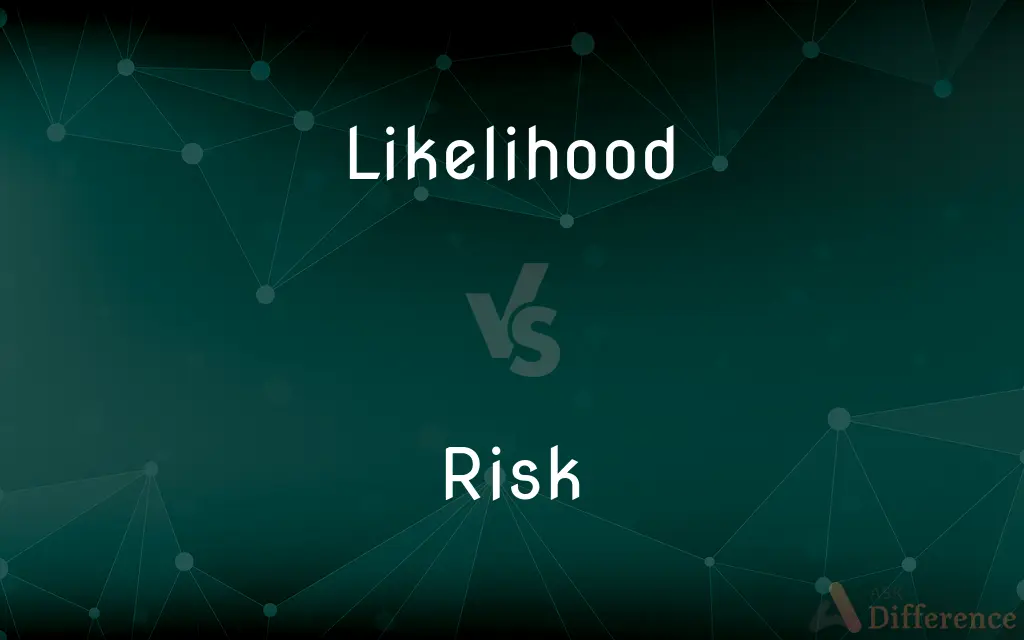Likelihood vs. Risk — What's the Difference?
Edited by Tayyaba Rehman — By Urooj Arif — Updated on May 9, 2024
Likelihood refers to the probability of an event occurring, focusing on possibility; risk emphasizes potential negative outcomes and measures the impact along with probability.

Difference Between Likelihood and Risk
Table of Contents
ADVERTISEMENT
Key Differences
Likelihood is a statistical measure that describes the probability that a specific event will occur. It expresses how likely an event is to happen without assessing the consequences of the event occurring. On the other hand, risk incorporates both the probability of an event occurring and the impact or severity of the consequences if it does happen.
In assessing likelihood, the focus is strictly on the chances of occurrence, often calculated using historical data or mathematical models. Whereas risk evaluation goes beyond just the occurrence, considering what negative outcomes might result and how they affect overall objectives.
For example, the likelihood of rain might be high based on weather forecasts. In contrast, the risk of rain involves considering the potential negative impacts, such as flooding or outdoor event cancellations.
While likelihood can apply to both positive and negative outcomes, risk is typically associated with negative consequences. Risk assessments are crucial in environments where decisions must account for safety, financial implications, and strategic outcomes.
In practical applications, likelihood might be used in a variety of predictive analytics across fields such as meteorology, economics, and health sciences. Risk, however, is more often discussed in contexts like insurance, project management, and cybersecurity, where mitigating negative outcomes is a priority.
ADVERTISEMENT
Comparison Chart
Definition
Probability of an event occurring
Probability and impact of adverse events
Focus
Event occurrence
Negative consequences
Measurement
Usually in probabilities
Probabilities and consequences
Common Fields
Statistics, Science
Business, Finance, Safety
Application
Predictive analytics
Decision making, Risk management
Compare with Definitions
Likelihood
Can be quantified using percentages.
There is a 70% likelihood of rain tomorrow.
Risk
Potential for loss or negative outcomes.
Investing in stocks involves financial risk.
Likelihood
Statistical measure in various analyses.
Researchers calculate the likelihood of disease spread.
Risk
Considered in planning and management.
Companies assess risk before launching products.
Likelihood
Probability or chance of an event happening.
The likelihood of snow in December is high.
Risk
Primarily associated with adverse effects.
Smoking poses a significant health risk.
Likelihood
Applies to both positive and negative events.
The likelihood of winning the lottery is low.
Risk
Involves mitigation and management strategies.
Fire drills are conducted to mitigate safety risks.
Likelihood
Used in forecasting and predictions.
Meteorologists discuss the likelihood of storms.
Risk
Measurement of hazard or danger.
There is a high risk of avalanches in this area.
Likelihood
The state or fact of something's being likely; probability
Situations where there is a likelihood of violence
Young people who can see no likelihood of finding employment
Risk
In simple terms, risk is the possibility of something bad happening. Risk involves uncertainty about the effects/implications of an activity with respect to something that humans value (such as health, well-being, wealth, property or the environment), often focusing on negative, undesirable consequences.
Likelihood
The state of being probable; probability.
Risk
The possibility of suffering harm or loss; danger.
Likelihood
Something probable.
Risk
A factor, thing, element, or course involving uncertain danger; a hazard
"the usual risks of the desert.
Likelihood
The probability of a specified outcome; the chance of something happening; probability; the state or degree of being probable.
In all likelihood the meeting will be cancelled.
The likelihood is that the inflation rate will continue to rise.
Risk
The danger or probability of loss to an insurer.
Likelihood
The probability that some fixed outcome was generated by a random distribution with a specific parameter.
Risk
The amount that an insurance company stands to lose.
Likelihood
Likeness, resemblance.
Risk
The variability of returns from an investment.
Likelihood
(archaic) Appearance, show, sign, expression.
Risk
The chance of nonpayment of a debt.
Likelihood
Appearance; show; sign; expression.
What of his heart perceive you in his faceBy any likelihood he showed to-day ?
Risk
One considered with respect to the possibility of loss
A poor risk.
Likelihood
Likeness; resemblance.
There is no likelihood between pure light and black darkness, or between righteousness and reprobation.
Risk
To expose to a chance of loss or damage; hazard.
Likelihood
Appearance of truth or reality; probability; verisimilitude.
Risk
To incur the risk of
His action risked a sharp reprisal.
Likelihood
Statistical probability; probability of being true or of occurring in the future; as, the likelihood of being abducted by aliens is close to zero..
Risk
(uncountable) The probability of a negative outcome to a decision or event.
There is risk of being brutalized, arrested, imprisoned and tortured, all because I want you to know the truth about this matter.
Likelihood
The probability of a specified outcome
Risk
(uncountable) The magnitude of possible loss consequent to a decision or event.
Risk
The potential negative effect of an event, determined by multiplying the likelihood of the event occurring with its magnitude should it occur.
Risk
(countable) A possible adverse event or outcome.
Risk
(insurance) A type of adverse event covered under an insurance policy.
Risk
(countable) A thing (from the perspective of how likely or unlikely it is to cause an adverse effect).
That man is going to be a big risk once he's out of prison.
Those stairs are a major risk.
Risk
A borrower (such as a mortgage-holder or person with a credit card).
A good credit rating indicates the customer is a desirable risk.
Risk
(finance) A financial product (typically an investment).
Subprime mortgages are poor risks; especially for a pension scheme.
Risk
(insurance) An entity insured by an insurer.
Risk
(transitive) To incur risk of (something).
Risk
(transitive) To incur risk of harming or jeopardizing.
Risk
(transitive) To incur risk as a result of (doing something).
Risk
Hazard; danger; peril; exposure to loss, injury, or destruction.
The imminent and constant risk of assassination, a risk which has shaken very strong nerves.
Risk
Hazard of loss; liabillity to loss in property.
Risk
To expose to risk, hazard, or peril; to venture; as, to risk goods on board of a ship; to risk one's person in battle; to risk one's fame by a publication.
Risk
To incur the risk or danger of; as, to risk a battle.
Risk
A source of danger; a possibility of incurring loss or misfortune;
Drinking alcohol is a health hazard
Risk
A venture undertaken without regard to possible loss or injury;
He saw the rewards but not the risks of crime
There was a danger he would do the wrong thing
Risk
The probability of becoming infected given that exposure to an infectious agent has occurred
Risk
The probability of being exposed to an infectious agent
Risk
Expose to a chance of loss or damage;
We risked losing a lot of money in this venture
Why risk your life?
Risk
Take a risk in the hope of a favorable outcome;
When you buy these stocks you are gambling
Common Curiosities
How are likelihood and risk measured differently?
Likelihood is usually measured by probabilities alone, while risk combines probabilities with potential impacts.
Why is risk assessment important in business?
It helps in making informed decisions and preparing for potential adverse outcomes.
What is the primary focus of likelihood?
The primary focus is on the probability of an event occurring.
How can understanding risk benefit individuals?
It helps in planning and preparing for potential hazards.
How does risk differ from likelihood in terms of impact?
Risk takes into account both the probability and the negative impacts of an event.
Can likelihood include positive outcomes?
Yes, likelihood can refer to both positive and negative events.
What type of strategies are used in risk management?
Strategies include prevention, mitigation, and contingency planning.
How is likelihood used in health sciences?
It is used to predict disease occurrence and spread.
What is an example of using likelihood in everyday life?
Estimating the likelihood of rain to decide whether to carry an umbrella.
Is risk always negative?
Yes, in the context of risk assessment, it typically focuses on negative outcomes.
Does likelihood need to consider consequences?
No, likelihood does not consider the consequences of an event.
What tools are used to assess risk?
Tools include risk matrices, software applications, and expert judgment.
Can likelihood change over time?
Yes, as new data becomes available, the estimated likelihood can change.
What is a real-world example of risk in action?
Evaluating the risk of cyber attacks when implementing new technology systems.
What industries heavily rely on risk analysis?
Industries such as finance, insurance, and healthcare rely extensively on risk analysis.
Share Your Discovery

Previous Comparison
Stock vs. Brace
Next Comparison
Consolable vs. ConsolingAuthor Spotlight
Written by
Urooj ArifUrooj is a skilled content writer at Ask Difference, known for her exceptional ability to simplify complex topics into engaging and informative content. With a passion for research and a flair for clear, concise writing, she consistently delivers articles that resonate with our diverse audience.
Edited by
Tayyaba RehmanTayyaba Rehman is a distinguished writer, currently serving as a primary contributor to askdifference.com. As a researcher in semantics and etymology, Tayyaba's passion for the complexity of languages and their distinctions has found a perfect home on the platform. Tayyaba delves into the intricacies of language, distinguishing between commonly confused words and phrases, thereby providing clarity for readers worldwide.
















































